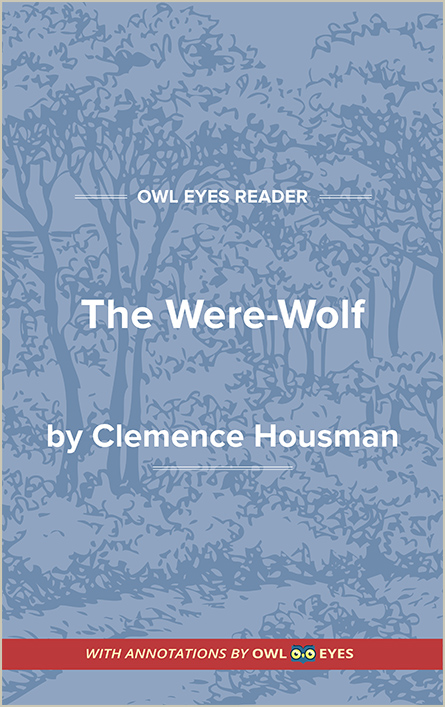Analysis Pages
Themes in The Were-Wolf
Combination of Feminine and Masculine Traits: At the beginning of the story, characters make distinct contrasts between traditionally feminine traits, such as beauty, and masculine traits, such as strength. Though the two are originally seen as exclusive, White Fell, with her striking looks accompanied by a handaxe, is a perfect mixture of both. Housman’s involvement in the suffragette movement advocating equal rights for women—which occasionally turned violent—may have influenced her depiction of White Fell, who is just as strong, intelligent, and competent as the men around her.
Transgression of Nature into Civilization (and Vice Versa): White Fell’s appearance at the home upends the order of the loving family, representing the transgression of the danger of nature into the comforts of civilization. Notably, only the dog Tyr and Christian—who has just spent some time in the wilderness hunting a bear—are able to immediately recognize White Fell as a danger. Following White Fell’s departure, Christian ventures into the surrounding forest, where he finds the natural world unwelcoming to his intrusion.
Supernatural Belief vs. Scientific Skepticism: The twin brothers have differing belief systems that contrast with each other. Christian is sympathetic to mysticism and the supernatural while Sweyn is a skeptic, valuing evidence over feeling or supernatural explanations. Both believe they are correct, but only Christian seeks out additional proof of his belief.
Sacrificial Love as Divine: In portraying selfless love even in the face of rejection and hate, Housman suggests that Christian’s love for Sweyn is love in its purest form, capable of defeating even the greatest of evils. Christian’s blood itself becomes an instrument of divine power—appropriate, given that he symbolically represents the biblical Jesus Christ. In contrast, Sweyn’s infatuation with White Fell causes him to turn against his loyal brother, mistaking protectiveness for jealousy again and again.
Themes Examples in The Were-Wolf:
The Were-Wolf
🔒"knowing himself so unworthy such perfect love...." See in text (The Were-Wolf)
"the dead body was his only shelter and stay in that most dreadful hour. His soul, stripped bare of all sceptic comfort, cowered, shivering, naked, abject; and the living clung to the dead out of piteous need for grace from the soul that had passed away...." See in text (The Were-Wolf)
"For he did not presume that no holy water could be more holy, more potent to destroy an evil thing than the life-blood of a pure heart poured out for another in free willing devotion...." See in text (The Were-Wolf)
"The clear stars before him took to shuddering, and he knew why: they shuddered at sight of what was behind him. He had never divined before that strange things hid themselves from men under pretence of being snow-clad mounds or swaying trees; but now they came slipping out from their harmless covers to follow him, and mock at his impotence to make a kindred Thing resolve to truer form...." See in text (The Were-Wolf)
"The elder brother, self-sufficient and insensitive, could little know how deeply his unkindness stabbed...." See in text (The Were-Wolf)
"the superstitious fears that Sweyn despised...." See in text (The Were-Wolf)
"Such love as his frank self-love could concede was called forth by an ardent admiration for this supreme stranger...." See in text (The Were-Wolf)
"Sweyn, the matchless among men, acknowledged in this fair White Fell a spirit high and bold as his own, and a frame so firm and capable that only bulk was lacking for equal strength...." See in text (The Were-Wolf)
"To the younger brother all life was a spiritual mystery, veiled from his clear knowledge by the density of flesh...." See in text (The Were-Wolf)
"Sweyn was a sceptic...." See in text (The Were-Wolf)
""Women are so easily scared," pursued Sweyn, "and are ready to believe any folly without shadow of proof. Be a man, Christian,..." See in text (The Were-Wolf)
"proud of all that Sweyn did, content with all that Sweyn was; humbly content also that his own great love should not be so exceedingly returned, since he knew himself to be so far less love-worthy...." See in text (The Were-Wolf)
""I fear neither man nor beast; some few fear me."..." See in text (The Were-Wolf)
"The fashion of her dress was strange, half masculine, yet not unwomanly...." See in text (The Were-Wolf)
"And then the wind would rage after its lost prey, and rush round the house, rattling and shrieking at window and door...." See in text (The Were-Wolf)
"Another and another of the white tufts was sent whirling round like a winged thing in a spider's web, and floating clear at last. ..." See in text (The Were-Wolf)

